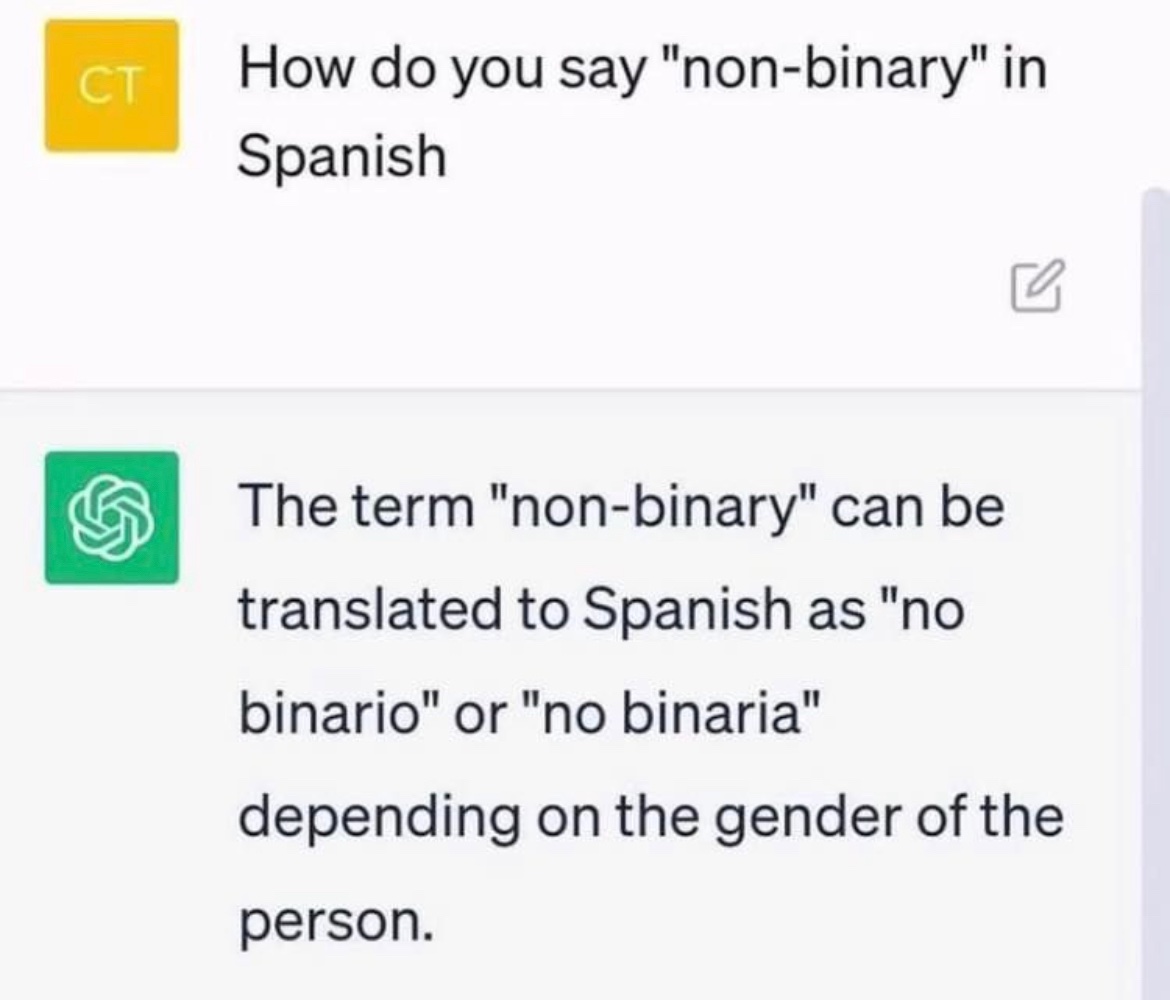Anime & Manga One Piece Spoilers - The Waiting Room
- Thread starter Bogard
- Start date
- Tags all hail peroroncino capybara room cattitude coc top 1 degenerate franky will say jewnicorn fitness on panel giselle is a sanji enjoyer hiyori <3 kaido>akainu linlin>your fav pero betrayed cruzeiro 1997 peroroncino4admin playa4admin real madrid > jobbermund reloaded is guilty and i can prove it tac for super admin this goblin is hungry for hints tobirama best hokage urouge top 1 wepo negs your fav woro top 1
More options
Who Replied?
As someone that speaks a very similar language to Spanish (portuguese) it actually looks correct, even if weird.
We don't actually have a neutral gender (the government tries to push one but most common people can't understand it) and when speaking we'll end up using a ending based on how the person looks. So não binário e não binária would be the most common usage.
Even when trying to be the most neutral possible, like stating something like: ''that person is non binary'' because of how the language works it would end up with ''Aquela pessoa é não binária''(because of how binária has to agree with the pronoun aquela) in colloquial language. Again, if you try the forced neutral language ''aquile'' most common people wouldn't understand.
I assume it's the same in most romance languages. Any native spanish speaker can answer that?
We don't actually have a neutral gender (the government tries to push one but most common people can't understand it) and when speaking we'll end up using a ending based on how the person looks. So não binário e não binária would be the most common usage.
Even when trying to be the most neutral possible, like stating something like: ''that person is non binary'' because of how the language works it would end up with ''Aquela pessoa é não binária''(because of how binária has to agree with the pronoun aquela) in colloquial language. Again, if you try the forced neutral language ''aquile'' most common people wouldn't understand.
I assume it's the same in most romance languages. Any native spanish speaker can answer that?
As someone that speaks a very similar language to Spanish (portuguese) it actually looks correct, even if weird.
We don't actually have a neutral gender (the government tries to push one but most common people can't understand it) and when speaking we'll end up using a ending based on how the person looks. So não binário e não binária would be the most common usage.
Even when trying to be the most neutral possible, like stating something like: ''that person is non binary'' because of how the language works it would end up with ''Aquela pessoa é não binária''(because of how binária has to agree with the pronoun aquela) in colloquial language. Again, if you try the forced neutral language ''aquile'' most common people wouldn't understand.
I assume it's the same in most romance languages. Any native spanish speaker can answer that?
We don't actually have a neutral gender (the government tries to push one but most common people can't understand it) and when speaking we'll end up using a ending based on how the person looks. So não binário e não binária would be the most common usage.
Even when trying to be the most neutral possible, like stating something like: ''that person is non binary'' because of how the language works it would end up with ''Aquela pessoa é não binária''(because of how binária has to agree with the pronoun aquela) in colloquial language. Again, if you try the forced neutral language ''aquile'' most common people wouldn't understand.
I assume it's the same in most romance languages. Any native spanish speaker can answer that?
For example, in south Slavic languages (Bosnian, Croatian, Serbian):
- nebinaran (male grammatical gender)
- nebinarna (female grammatical gender)
Using a neutral version - nebinarno - would paint the person as an object, which would be weird.








